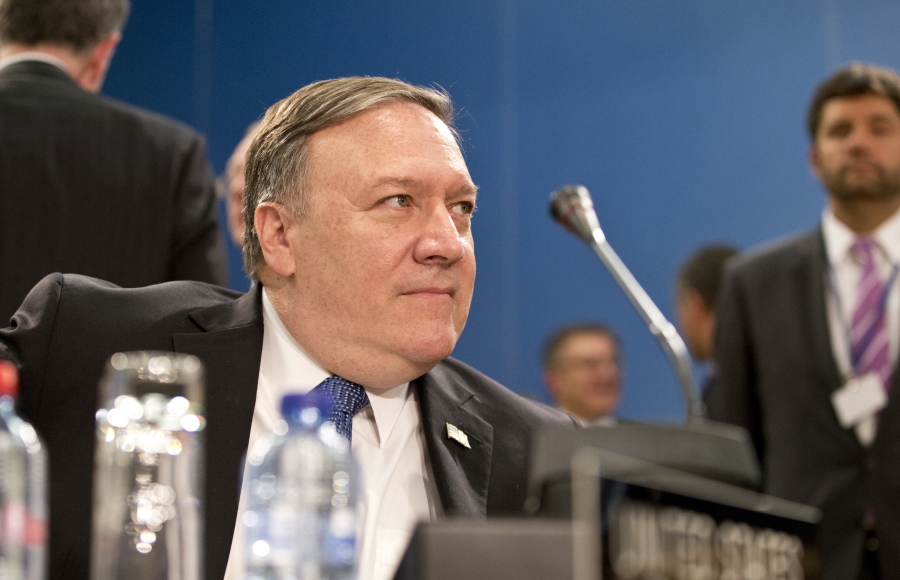RIYADH, Saudi Arabia — The United States is asking its allies around the world to place more sanctions on Iran over its ballistic missile program, U.S. officials said Saturday as Secretary of State Mike Pompeo arrived in Saudi Arabia on the first leg of a three-country trip in the Middle East.
“Iran’s ballistic missile program is an international threat to peace and security,” said a senior State Department official, talking to reporters on condition of anonymity about talks Pompeo is having in Riyadh and will hold later this weekend in Israel and Jordan.
“We are urging nations around the world to sanction individuals and entities associated with Iran’s missile program, and it’s been a big part of our discussions with the Europeans.”
The campaign to urge other nations to crack down on Iran is reminiscent of the maximum-pressure campaign the United States has been waging to get North Korea to negotiate an end to its nuclear program.
It carries particular resonance in Riyadh, which has been hit numerous times over the past four months by missiles fired by Iranian-backed Houthi rebels in neighboring Yemen. Just Saturday morning, a few hours before Pompeo arrived from a NATO meeting in Brussels, Saudi Arabia said it shot down four missiles launched from the Yemeni side of the border.
The sharpened focus on Iran’s missile programs comes as President Donald Trump is nearing a May 12 deadline to decide whether to extend waivers on sanctions against Iran that were suspended when a multi-nation agreement was struck in 2015 to curb Tehran’s nuclear program.
The United States has been negotiating with European allies to find a way to cobble together what it calls a supplementary agreement that would squeeze Iran over issues such as its missile program.
The administration considers the program a “priority threat that must be addressed.” The discussions with the Europeans have involved ballistic and cruise missiles, as well as space-launch-vehicle activities related to intercontinental ballistic missiles.
“Iran possesses the largest ballistic-missile arsenal in the region,” the State Department official said. “Iran’s missiles prolong war and suffering in the Middle East. They threaten our security and economic interests and they especially threaten Saudi Arabia and Israel. There is a growing international awareness of the need to impose costs on Iran’s missile programs and to do so urgently.”
In his maiden foreign trip since being sworn in as secretary of state Thursday, Pompeo is expected to keep the focus on Iran.
Saudi Arabia, the chief regional rival to Iran, is considered key in the effort to counter Tehran’s ambitions.
Another senior State Department official said Pompeo will urge the Saudis to settle their dispute with Qatar, which is the subject of a punishing economic blockade imposed by the Saudis and other Gulf countries. The United States says the dispute is benefiting Iran as much as it hurts Qatar, and holds all countries involved in the squabble to be partially to blame.
“We see in the cleavage lines … room for Iran to play, and room for a less-than-maximally-effective effort against the other problems in the region, namely the fight against ISIS and violence of Sunni jihadism,” the official said.
Pompeo will discuss the administration’s efforts to rein in Iran when he talks Sunday with Israeli Prime Minister Benjamin Netanyahu and then heads to Amman to speak with King Abdullah II. He has no plans to meet with Palestinian President Mahmoud Abbas or any other Palestinians, either in the West Bank or in Amman, U.S. officials said.



